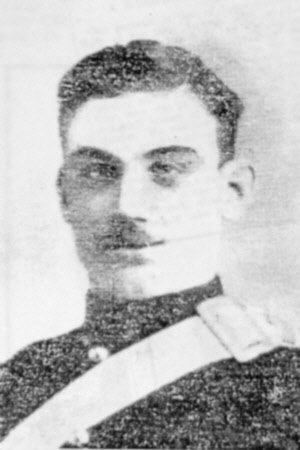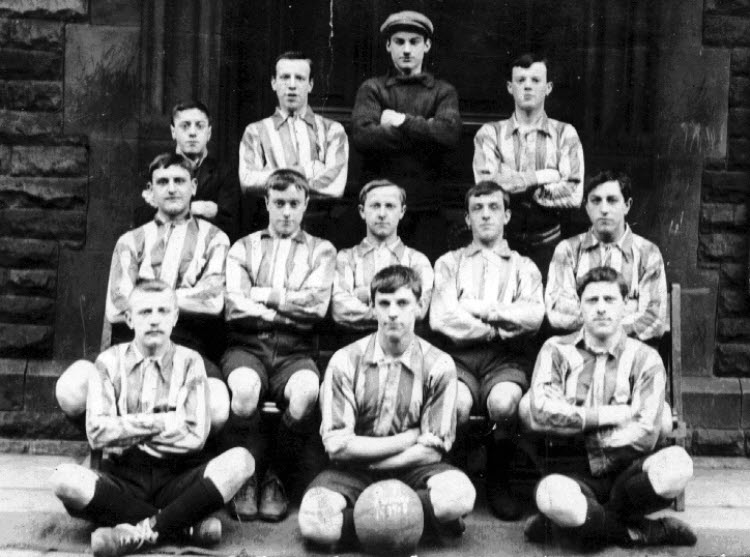
Lance Corporal John Etty was a regular soldier having joined the British Army in 1911. He was also the first Ossett man to become a WW1 prisoner of war on the 24th August 1914 during his regiment’s action at Elouges during the Battle of Mons. This was just ten days after he had arrived in France with the 18th (Queen Mary’s Own) Hussars. The 18th (Queen Mary’s Own) Hussars went to France with the original BEF as part of the 2nd Cavalry Brigade, (1st) Cavalry Division. Many of those from the 18th Hussars captured at Elouges were held at a PoW camp at Munster until being sent to Baden Baden and then eventually repatriated.
John Etty was born in 1890, in Dewsbury, the son of Henry Etty and Emma (nee Moiser) who were married in 1877 also in Dewsbury. In 1891, the Ettys are living at Heaton Lodge, Earlsheaton with their family: Elizabeth (12) , Marion (3) and John (1). All of the children were recorded as being born in Soothill Nether. In 1901, Henry Etty is described as a “horseman – coal mine bottom” living in Chickenley Lane, Earlsheaton, but there is no sign of his wife Emma. John was now aged 11 and living with his father and his sister Marion aged 13. A police constable, John Hebden is lodging with the Etty family in 1901.
In 1911, Henry Etty is still a “horse keeper at a colliery” and the Etty family are still living at Chickenley Lane, Earlsheaton. Henry Etty is described as married, but again there is no sign of his wife Emma. Instead, there is a housekeeper, 64 year-old Annie Humphries. Henry does record that his marriage saw six children being born but only two survived to 1911. Elizabeth Etty, shown in the 1891 census had died in 1892, aged 14. However, by 1911 John Etty has joined the Army and is recorded as Private John Etty at Aliwal Military Barracks, South Tedworth, Hants. It is known that he spent some time in Ireland, before 1911, where 18th Hussar recruits were taught how to ride and the rudiments of cavalry warfare. Even in 1914, horse mounted cavalry troops were regarded as essential.
The “Ossett Observer” 1 carried this report headed “Missing Ossett Hussar” in September 1914:
“Our portrait is that of Lance Corporal John Etty, of the 18th Hussars, who as stated in our last issue, has been reported by the War Office among the list of ‘missing’ after an engagement with the enemy on the 24th ult. One of Sir John French’s despatches stated that the 18th Hussars suffered heavy losses in the fighting which began at Mons. Lance- corporal Etty who was 23 years of age last November was well-known in Ossett and the immediate district. He was brought up in the Chickenley Heath neighbourhood, his father Mr. Henry Etty, for the past 22 years, being employed at Low Laithes Collieries, Gawthorpe. As a lad, Lance-corporal Etty attended the Chickenley Lane school and was for some years a choir boy at the Gawthorpe and Chickenley Heath Church, often singing solos. Later he continued to take an interest in singing and eventually associated himself with the Bethesda United Methodist and Zion Congregational Church choirs. As a tenor soloist, he was popular, and from time to time sang at several local churches and at the Ossett Temperance Hall, doing so even on his visits home on furlough. He joined the Army five years ago last April, and prior to the outbreak of the war, was for some time stationed in Ireland and afterwards in Wiltshire. He was also well-known locally as an amateur ‘soccer’ footballer, at one time being the goalkeeper for the Ossett Temperance club. Just over a month ago, his father received a postcard from him, stating that he was about to sail for the front, and another a few days later, with the information that he had landed on the Continent.”
In 1914, the British army that comprised the BEF sent to France was an all volunteer force, and therefore much smaller than the conscript army of the Germans. Kaiser Wilhelm II described them as “a contemptible little army” a disparaging term, since he believed the BEF was too small to cause the 4 million German troops engaged in carrying out the Schlieffen Plan any real problems. Taking the slur as a compliment, the BEF adopted the name “the Old Contemptibles” after delaying, but ultimately retreating from the much larger German forces at the Battle of Mons. This was the first action fought by British troops on mainland Europe since the Crimean War. However, no evidence of any such order being issued by the Kaiser has ever been found and it was more likely a British propaganda invention, albeit one often repeated as fact. What the Kaiser said and this can be confirmed by documentation, was “ihre zerlumpte kleine Armee” which translates to “their ragged little army” and nothing more. It does, however, demonstrate the tenacity with which the British fought and in the process they stopped a much larger and better prepared German army.
At Mons, the British Army attempted to hold the line of the Mons–Condé Canal against the advancing German First Army. Although the British fought well and inflicted disproportionate casualties on the numerically superior Germans, they were eventually forced to retreat due both to the greater strength of the Germans and the sudden retreat of the French Fifth Army, which exposed the British right flank. Though initially planned as a simple tactical withdrawal and executed in good order, the British retreat from Mons lasted for two weeks and took the BEF to the outskirts of Paris before it counter-attacked in concert with the French, at the Battle of the Marne.
During the retreat on the 24th August 1914, on the extreme left of the British line, the 14th and 15th Brigades of the 5th Division were threatened by a German outflanking move and were forced to call for help from the cavalry. The 2nd Cavalry Brigade (including Etty’s 18th Hussars), along with the 119th Battery RFA and L Battery RHA, were sent to their aid. Dismounting, the cavalry and the two artillery batteries, screened the withdrawal of the 14th and 15th Brigades during four hours of intense fighting.
Quite a number of men in John Etty’s 18th Hussars were captured by advancing German troops at Dour, south of Elouges on the 24th August 1914 in the confusion that occurred during the British retreat at the Battle of Mons. They spent the much of the rest of WW1 as prisoners of war, with many of the 18th Hussars held at Soltau PoW camp. Some PoWs from Soltau camp (possibly including John Etty) were sent to Holland in 1917 and 1918 as part of an exchange program with German PoWs.
John Etty did eventually make it home to Ossett and he married Sarah Elizabeth Wilkinson in the September quarter of 1919. He died aged 75 in 1965 whilst still living in the Ossett/Dewsbury area.

Above: Ossett Temperance (Ossett Teddies) football team in 1907/08. John Etty is the goalkeeper in this picture in the back row wearing the cap.
References:
1. “Ossett Observer”, 26th September 1914